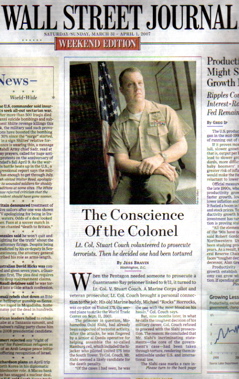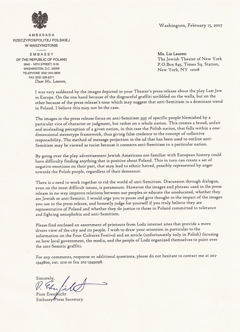Straight Up |: March 2007 Archives
Here's one of those Wall Street Journal frontpagers that ought to be required reading for its editorial board: "The Conscience of the Colonel," by Jess Bravin. It's about a military prosecutor with a deeply personal reason to seek the conviction of a Gitmo prisoner connected to 9/11 and an even deeper reason not to prosecute him.
 The prosecutor's "old Marine buddy, Michael 'Rocks' Horrocks, was co-pilot on United 175, the second plane to strike the World Trade Center on Sept. 11, 2001," Bravin writes. "The prisoner in question, Mohamedou Ould Slahi, had already been suspected of terrorist activity. After the attacks, he was fingered by a senior al Qaeda operative for helping assemble the so-called Hamburg cell, which included the hijacker who piloted United 175 into the South Tower. To Col. Couch, Mr. Slahi seemed a likely candidate for the death penalty."
The prosecutor's "old Marine buddy, Michael 'Rocks' Horrocks, was co-pilot on United 175, the second plane to strike the World Trade Center on Sept. 11, 2001," Bravin writes. "The prisoner in question, Mohamedou Ould Slahi, had already been suspected of terrorist activity. After the attacks, he was fingered by a senior al Qaeda operative for helping assemble the so-called Hamburg cell, which included the hijacker who piloted United 175 into the South Tower. To Col. Couch, Mr. Slahi seemed a likely candidate for the death penalty."
"Of the cases I had seen, he was the one with the most blood on his hands," Col. Couch says.But, nine months later, in what he calls the toughest decision of his military career, Col. Couch refused to proceed with the Slahi prosecution. The reason: He concluded that Mr. Slahi's incriminating statements -- the core of the government's case -- had been taken through torture, rendering them inadmissible under U.S. and international law.
The Slahi case marks a rare instance of a military prosecutor refusing to bring charges because he thought evidence was tainted by torture.
It's too bad Bravin's reporting legitimizes a newspaper whose editorial writers and columnists refuse to believe the work of the paper's own news staffers like him.
This was the week to remember the invasion of Iraq and the climate of opinion four years ago, per "The Ides of March, 2003." Can't let it pass without recalling what I posted at the time on MSNBC.com, links included. (Miracle of miracles, many still work).
Looking back, I see the posts are very tame. I tried not to be, but I knew I could go only so far. Most of the stuff did not sit well with certain company-minded bosses to whom I reported. I was never asked to take a particular point of view, but I was called on the carpet for the viewpoint I took. They wanted me to stick strictly to entertainment commentary without harping on the war or emphasizing antiwar views.
![Me in 2003 [Photo and logo: MSNBC.com]](http://www.artsjournal.com/herman/Herman%20Juice%20Head.gif)
March 13, 2003 / 12:59 p.m. ETThe case for war branding: Selling war to the public depends on branding. Well-branded wars include the American Revolution, the Civil War, World War I and World War II. Poorly branded wars are losing or less-than-winning propositions. They include the War of 1812, the Korean War, the Vietnam War and the Gulf War.
Is this nutty thinking or what? If you answered "or what?" you would make Tracey Riese, 46, a happy branding warrior.
First he took on the Polish government, which claims he's stereotyping Poles as anti-Semites, a charge he denies. Now he's taking on a bigger fish -- The New York Times, which has declined to review his play.
 In an open letter to news media, Tuvia Tenenbom accuses The Times of doing "the Polish government's bidding ... by refusing to allow Times critics to review 'Last Jew in Europe.'" The play opened last week in an off-Broadway theater on Manhattan's Upper West Side.
In an open letter to news media, Tuvia Tenenbom accuses The Times of doing "the Polish government's bidding ... by refusing to allow Times critics to review 'Last Jew in Europe.'" The play opened last week in an off-Broadway theater on Manhattan's Upper West Side.
The letter also calls for the firing of the recently appointed chief of The Times theater department, Rick Lyman, whom Tenenbom deems responsible for "censorship by omission" and an attempt to "stifle free speech."
I phoned Lyman for his response. He declined to comment, referred me to The Times spokeswoman Catherine Mathis, and hung up on me in mid-sentence. She was unavailable. (See PPS, below.)
Several major European newspapers and magazines have written about the play, in largely laudatory terms, including the top German weekly news magazine Der Spiegel ("Das Drama mit dem Antisemitismus"), the Frankfurt daily Frankfurter Rundschau ("Tuvia & Erika"), and Italy's most respected daily Corriere della Sera ("Teatro d'accusa").
"It never occurred to us that The New York Times would join with anti-Semites so easily," Tenenbom writes. "We did not ask for a 'good' review; all we asked for was that this important project not be ignored." He contends that the paper's unwillingness to write about the play is a "slap in the face on an issue of utmost concern to millions of American Jews, many of whom are faithful readers of the Times." The paper has covered other plays of his.
Full disclosure: I reviewed the play last week.
Text, subtext and context, David Ehrenstein's op-ed in today's Los Angeles Times is cultural critiquing at its finest -- the best I've read to date about Barack Obama. It begins:
As every carbon-based life form on this planet surely knows, Barack Obama, the junior Democratic senator from Illinois, is running for president. ... But it's clear that Obama also is running for an equally important unelected office, in the province of the popular imagination -- the "Magic Negro."
And it ends:
Like a comic-book superhero, Obama is there to help, out of the sheer goodness of a heart we need not know or understand. For as with all Magic Negroes, the less real he seems, the more desirable he becomes. If he were real, white America couldn't project all its fantasies of curative black benevolence on him.
In between, Ehrenstein provides substantial insight based on evidence drawn from Hollywood trivia that few cultural critics have the expertise to marshall and fewer still would know how to apply to matters of race and politics.
Katrina vanden Heuvel writes: "Jan -- Enjoyed your post this Sunday." Nice of her to say so. But here's the real import of her message:
The WashPost editorial page is beyond the pale at this stage not only on Iraq, but on fundamental issues of justice. A week or so ago it was attacking efforts to strengthen the right to organize among workers in this country; then it dismissed the Libby verdict; and on Russia, it crusades with a vengeful hypocrisy.
Vanden Heuvel, who is the editor and publisher of The Nation, also sent her Sunday piece "End the War (On Terror)," the latest entry in her blog Editor's Cut. It marks the fourth anniversary of "America's war against Iraq" as a "time to consider the longterm damage [of] the misconceived 'war on terrorism.'"
BananaRepublicans will accuse her of "mandating failure" of course -- as if they have any right to preach about success -- but it's just another of their galling pet phrases (like "micromanaging the war") to deflect attention from their own arrogance and incompetence.
A friend who deals in matters of national security writes: "All the major newspapers seem to have a common, inexplicable blind spot in discussing the war in Iraq, which I find very disturbing because it obfuscates the fundamental failures, their nature, and their cause." The most recent example is today's editorial, "Lessons of War," in The Washington Post:
Clearly we were insufficiently skeptical of intelligence reports. It would almost be comforting if Mr. Bush had "lied the nation into war," as is frequently charged. The best postwar journalism instead suggests that the president and his administration exaggerated, cherry-picked and simplified but fundamentally believed -- as did the CIA -- the catastrophically wrong case that then-Secretary of State Colin L. Powell presented to the United Nations [emphasis added].
In fact, "many high-level, very experienced career CIA people not only did not believe the stuff, but knew it was wrong," my correspondent notes. "The same is true at State and the Pentagon. The believers were the political appointees -- the agency or department bosses and therefore their unimpeachable mouthpieces, the bosses' immediate staffs, and the upward-bound opportunists. Why should but fundamentally believed even be in the sentence? The core failure at CIA, State, and Defense is that the facts were side-tracked and those who knew them and would speak them were muzzled."
Amen, brother.
Postscript: Furthermore, "take Powell's function as a mouthpiece: An Army four star who does not even suspect that the 'mobile bio-weapons labs' might be just hydrogen generators for inflating artillery weather balloons -- if anything at all? Even though our own Army has them? Even when the intelligence source is Curveball and only Curveball -- whom the CIA knew at the time to be a fabricator? I often wonder whether the editors read their own papers."
Worse, do the editors read their own papers and either 1) not care or 2) choose, for any number of reasons, to act as mouthpieces themselves?
![THE ACTUAL CARICATURES: (From left) Fran Lebowitz, Graydon Carter, Gwyneth Paltrow, Bono, Robert De Niro, Harvey Weinstein [Illustration by Drew Friedman for The New York Observer] CLICK TO ENLARGE](http://www.artsjournal.com/herman/pantheonic%20160.jpg) Something else to turn your stomach: The Waverly Inn in the West Village -- Manhattan's "latest clubhouse to the rich and famous under the direction of its host-with-the-mostest, Vanity Fair editor Graydon Carter" -- where a $50,000 mural by Edward Sorel features caricatures of Anaïs Nin, e.e. cummings, Jackson Pollock, Bob Dylan, William S. Burroughs, Eugene O'Neill, etc. But the actual caricatures are the host and his rich-and-famous customers.
Something else to turn your stomach: The Waverly Inn in the West Village -- Manhattan's "latest clubhouse to the rich and famous under the direction of its host-with-the-mostest, Vanity Fair editor Graydon Carter" -- where a $50,000 mural by Edward Sorel features caricatures of Anaïs Nin, e.e. cummings, Jackson Pollock, Bob Dylan, William S. Burroughs, Eugene O'Neill, etc. But the actual caricatures are the host and his rich-and-famous customers.
It was two months ago that the Ventriloquist Dummy claimed "good management" to justify the Justice Department's political purge of federal prosecutors. Now that his excuse has been exposed as one more Orwellian lie in a cynical grab for power by the BananaRepublic's very own President With His Head Up His Ass, the VD's nonconfession that "mistakes were made" reminds me of The Pure Malarkey of Softspeak and his Tortured Testimony in January of 2005.
![Jerusalem-born playwright TUVIA TENENBOM [photo: courtesy der Spiegel]](http://www.artsjournal.com/herman/Tenenbom%20photo.jpg) The government of Poland objects to "Last Jew in Europe," a play by Tuvia Tenenbom that documents and then satirizes the anti-Semitism still visibly thriving in Lodz, the country's second-largest city, a half-century after the Holocaust. Staged with the simplified power of a cartoon, "Last Jew" puts Polish anti-Semites on trial by ridicule. No wonder the government protests.
The government of Poland objects to "Last Jew in Europe," a play by Tuvia Tenenbom that documents and then satirizes the anti-Semitism still visibly thriving in Lodz, the country's second-largest city, a half-century after the Holocaust. Staged with the simplified power of a cartoon, "Last Jew" puts Polish anti-Semites on trial by ridicule. No wonder the government protests.
Self-hating Jews are not spared, either. And Mormons are also likely to be upset when they get wind of the show, which opened Sunday at The Triad Theater in Manhattan. A young Utah missionary from The Church of Jesus Christ of Latter-Day Saints is a central figure in the action. He arrives in Lodz seeking the names of Jews buried in the local cemetery so he can have them baptized -- retroactively. ("Why is he interested in dead Jews?" "I heard they have a law in America to recycle everything.")
![Lila Donnolo (as Maria) and Csaba S. Lucas (as Józef, her fiancé) [photo: courtesy der Spiegel]](http://www.artsjournal.com/herman/maria%20and%20fiance.jpg) The plot revolves around the wedding plans of a butcher's daughter and a morgue pathologist's son. She's a hot young thing who drinks like a sailor and moves like a go-go dancer. Her father is a pastor in the Crucified Church of Christ in Christ. Her fiancé is a Jew, or so he thinks. And of course he's a klutz. The Mormon interloper complicates the couple's plans. Like it or not, "Last Jew in Europe" is the theatrical equivalent of a graphic novel. (More sample dialogue: "Americans know everything. They have good satellites.")
The plot revolves around the wedding plans of a butcher's daughter and a morgue pathologist's son. She's a hot young thing who drinks like a sailor and moves like a go-go dancer. Her father is a pastor in the Crucified Church of Christ in Christ. Her fiancé is a Jew, or so he thinks. And of course he's a klutz. The Mormon interloper complicates the couple's plans. Like it or not, "Last Jew in Europe" is the theatrical equivalent of a graphic novel. (More sample dialogue: "Americans know everything. They have good satellites.")
Tenenbom's outrageously comical take on anti-Semitism and Jewish self-hatred is a long way from the somber vision of Art Spiegelman's in "Maus," for instance. But Tenenbom, the provocateur, is no less serious in his grim estimate of human nature. He says he based the play partly on "a real story," partly on his own travels in Poland, and partly on the "rampant" anti-Semitic graffiti he saw everywhere in Lodz.
 Fire did not engulf the stage, as promised in a press release, and the spectacle of crosses with "crucified young females nailed onto them" also failed to materialize. But they weren't needed. As performed by an enthusiastic troupe, "Last Jew" easily made its point without having to go any further over the top.
Fire did not engulf the stage, as promised in a press release, and the spectacle of crosses with "crucified young females nailed onto them" also failed to materialize. But they weren't needed. As performed by an enthusiastic troupe, "Last Jew" easily made its point without having to go any further over the top.
So much happens when Straight Up's staff of thousands leaves town. Here's something else that happened. We regret not being there. It isn't everyday that Robert Fisk picks up a Freedom Prize worth $350,000.
![Robert Fisk received the Lannan Foundation's 2006 Lifetime Achievement Prize for Cultural Freedom at Town Hall [illustration from NYC Arabic Language & Culture Club]](http://www.artsjournal.com/herman/fisk%20town%20hall%20260.jpg) But we caught up with him by proxy on Democracy Now! Amy Goodman asked him in an interview to explain why he considered the prize as "important as a flak jacket." She said that's what he'd told the crowd at Town Hall in Manhattan, where the award ceremony was held Saturday.
But we caught up with him by proxy on Democracy Now! Amy Goodman asked him in an interview to explain why he considered the prize as "important as a flak jacket." She said that's what he'd told the crowd at Town Hall in Manhattan, where the award ceremony was held Saturday.
Fisk, if you don't already know, is the veteran Middle East correspondent for The Independent of London, and the author of several books, including "The Great War for Civilisation" (see Postscript, below*) and "Pity the Nation."
He had much to say worth hearing, as usual. Speaking of Iraq and Afghanistan, for instance, he noted:
[T]his is the first war I've ever covered in which the leadership in the West bases its policies on its own lies. I mean, it's one thing to lie to the people, and then you have your own policy of how to pursue a war, but to pursue the war on the basis of the lies you're telling the people, this is an entirely new concept in war and strategy in foreign policy. I've never seen it before.
Do I hear any bravos for Justin Davidson's principled stand against the Vienna Philharmonic? He wrote he would not be attending the orchestra's Carnegie Hall concerts this past weekend. For that matter, he added, "it may be years before I review it again." This is no small thing. Davidson is a Pulitzer Prize-winning music critc with readers in the New York region.
His piece in Newsday, headlined "Vienna is slow to change its tune," appeared while I was away in Alabama.
Further, Davidson wrote: "I believe that the Vienna Philharmonic has relinquished its claim to serious consideration as a dynamic cultural organization." To feminists who have criticized its exclusion of women that has been obvious for decades, as well as the fact that "the geological pace of change is not merely a regrettable obstacle in the relentless pursuit of quality. It is the product of a narrowly preservationist, antiquarian philosophy, which fetishizes sound at the expense of spirit."
But Davidson makes the unusual point, so easily overlooked, that the orchestra's backward attitude contradicts the most significant aspect of its musical history:
The composers in the Vienna Philharmonic's pantheon were all disturbers of the peace, and they railed against the city's recurring fondness for the status quo. Beethoven was a liberal idealist, a radical egalitarian and artistic revolutionary who would have been revolted by the claim that performing his forward-looking, constantly renewable music required an inflexible reverence for custom.
"This idea that the true tradition of the orchestra is one of innovation is very interesting," says William Osborne, the Vienna Phil's longtime nemesis. "It was only after the Nazification of the orchestra during World War II that it became associated with conservatism and tradition."
Sites to See
AJ Blogs
AJBlogCentral | rssspecial
the blog of the National Performing Arts Convention
Terry Teachout on the arts in New York City
Andrew Taylor on the business of arts & culture
rock culture approximately
Rebuilding Gulf Culture after Katrina
Douglas McLennan's blog
Art from the American Outback
No genre is the new genre
John Rockwell on the arts
Jan Herman - arts, media & culture with 'tude
dance
Apollinaire Scherr talks about dance
Tobi Tobias on dance et al...
jazz
Howard Mandel's freelance Urban Improvisation
Focus on New Orleans. Jazz and Other Sounds
Doug Ramsey on Jazz and other matters...
media
Jeff Weinstein's Cultural Mixology
Martha Bayles on Film...
classical music
Greg Sandow performs a book-in-progress
Exploring Orchestras w/ Henry Fogel
Harvey Sachs on music, and various digressions
Kyle Gann on music after the fact
Greg Sandow on the future of Classical Music
Norman Lebrecht on Shifting Sound Worlds
publishing
Jerome Weeks on Books
Scott McLemee on books, ideas & trash-culture ephemera
theatre
Wendy Rosenfield: covering drama, onstage and off
Chloe Veltman on how culture will save the world
Elizabeth Zimmer on time-based art forms
visual
Public Art, Public Space
John Perreault's art diary
Lee Rosenbaum's Cultural Commentary
Tyler Green's modern & contemporary art blog
![MEMORIAL CELEBRATION FOR EMMETT WILLIAMS (Sunday, April 1, 2007, beginning at 7 p.m., 537 Broadway @ Spring Street, 2nd floor, New York City (212.925.7651). Event organizer: Geoffrey Hendricks (212.431.8625 or cloudsmith@aol.com) [Photos: Ann Noel with Emmett Williams, Poznan, Poland (2005), performing Robert Filliou's score 13 WAYS TO USE EMMETT WILLIAMS' SKULL]](http://www.artsjournal.com/herman/EW%20invitation%20Original%20back%20400.jpg)

![Katrina vanden Heuvel, editor & publisher of The Nation [Photo: Michael Lorenzini]](http://www.thenation.com/images/people/katrina_vanden_heuvel.jpg)
